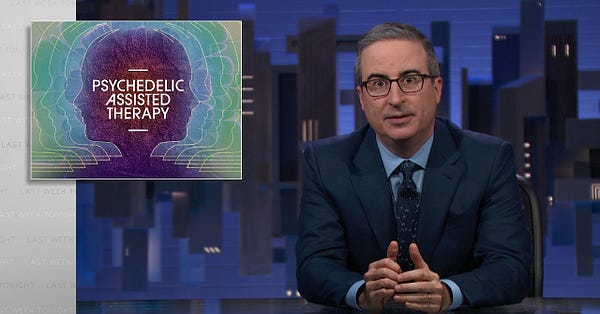Virginia, Washington, Utah bills in peril; Treating mental health issues by getting inside cells; and the EU risks falling behind the U.S. and Australia in psychedelics development
Plus: Beckley receives FDA approval for phase IIb 5-MeO-DMT study and Last Week Tonight delves into psychedelics
Happy Friday, and welcome back to The Microdose, an independent journalism newsletter brought to you by the U.C. Berkeley Center for the Science of Psychedelics.
State of Psychedelics: Virginia, Washington, Utah bills in peril
Since the beginning of this year, over a dozen states have introduced psychedelics legislation. Two months into states’ legislative sessions, some of those bills are already dead. In Virginia, state representatives voted against a bill that would reclassify psilocybin from Schedule I to Schedule III. The bill had already passed the state senate. That’s the second psychedelics bill Virginia lawmakers have rejected this legislative session; the other, HB 1513, would have allowed people with end-of-life anxiety, PTSD, and treatment-resistant depression to use psilocybin with a doctor’s recommendation. The House Courts of Justice subcommittee tabled the bill, essentially killing it.
Washington state’s Senate Bill 5263 originally proposed that the state establish psilocybin services similar to Oregon, but the Senate Committee on Labor & Commerce has altered the bill so that it would now only establish an advisory committee to develop a plan to roll out such services.
In Utah, Senate Bill 200 continues to move forward, but it faces opposition from Governor Spencer Cox. “Even if it does gain approval from the Senate and House — which appears unlikely — it would probably be headed for a veto,” Deseret News reports. The bill would allow people in hospice care or with PTSD, anxiety, or depression to receive psilocybin-assisted therapy.
Treating mental health issues by getting inside cells
In the 1990s, a theory about depression spread through the public: depression could be caused in part by an imbalance in brain chemicals — specifically, a deficiency in a neurotransmitter called serotonin, which binds to and activates proteins called 5-HT2A receptors. Scientists knew serotonin levels could affect learning, memory, and mood, and theorized that depression and PTSD could lead to long-term damage in connections between neurons. To treat depression, psychiatrists prescribed selective serotonin reuptake inhibitors (SSRIs) like escitalopram (Lexapro) and fluoxetine (Prozac), which could increase serotonin levels and potentially help repair those damaged connections.
Classical psychedelics, too, act on 5-HT2A receptors, which is why many studies aim to compare the efficacy of psychedelics versus SSRIs in treating mental health issues. In a new paper published in Science, University of California, Davis researchers present new evidence comparing and contrasting how SSRIs and psychedelics work in the brain. The upshot: though both SSRIs and psychedelics stimulate 5-HT2A receptors, it seems psychedelics are more likely to stimulate growth of neurons by getting inside cortical nerve cells — and that internal stimulation may be key for alleviating depressive symptoms.
The researchers probed the physical differences between the compounds. Psychedelic compounds like DMT and psilocin are more fat-soluble than the naturally occurring neurotransmitter serotonin, allowing them to more easily pass through cell walls and stimulate 5-HT2A receptors inside cells. It seems that there’s something special about these compounds reaching the inside of 5-HT2A receptors; when researchers modified serotonin to slip into cells, it too, stimulated neuron growth. When the scientists administered mice with that modified serotonin, they were more likely to keep swimming when dunked in a tank of water the next day, which is a common way of measuring depressive tendencies in mice. (Mice with depression-like symptoms give up more easily and just float instead.)
The time scale here is noteworthy: just 24 hours after serotonin could reach the inside of these rats’ receptor cells, they showed anti-depressive tendencies. That contrasts with the timescale at which SSRIs typically work: people often need to take the drugs for weeks before noticing its effects. “Ultimately, I hope this leads to better medicines,” David Olson, who conceived of the project, told Science News.
Want the latest psychedelics news? Subscribe! (It’s free!)
EU risks falling behind the U.S. and Australia in the psychedelics development, six EU parliament members warn
Last week, six members of the European Parliament sent letters to the heads of the European Medicines Agency (EMA) and the European Monitoring Center for Drugs and Drug Addiction (EMCDDA) highlighting the “significant research, policy, and regulatory advancements” in the U.S. and Australia, and urging the EU to get on board. “We’d like to express our concern about the lack of similar progress happening in the EU which is creating a disadvantage for millions of Europeans affected by mental health conditions and substance use disorders,” they write.
The Microdose reviewed the two letters, signed by parliament members Alex Agius Saliba, Frédérique Ries, Jarosław Duda, Robert Biedroń, Sara Cerdas, and Tilly Metz. They both encourage the EMCDDA and EMA to reform the international drug scheduling system. “Currently approval of scheduled medicines (by regulators such as EMA) and rescheduling are effectively synonymous,” they write, and “the existing rescheduling process favours patentable and expensive synthetic substances over existing inexpensive alternatives.” They suggest the EMA and EMCDDA could educate EU institutions and member states about these issues and psychedelics research through releasing reports and holding workshops to bring together scientists, EU agencies, and patient organizations.
Beckley receives FDA approval for phase IIb 5-MeO-DMT study
This week, biotech company Beckley Psytech announced that it has received FDA approval for a phase IIb clinical trial using BPL-003, a synthetic version of 5-MeO-DMT, for treatment-resistant depression. Back in November, the company announced completion of its phase I trial to assess the drug’s safety, and it announced its phase IIa study in December.
A quick refresher on clinical trial phases: phase I trials evaluate a drug’s safety in a small number of participants, while phase II studies typically include hundreds of participants to investigate how effective the drug is in treating a particular disease or illness, and its potential side effects. Sometimes phase II trials are split into IIa and IIb trials; phase IIa trials are often more exploratory or preliminary.
According to Beckley, this is the first time the FDA has provided Investigational New Drug approval for 5-MeO-DMT treatment. The new study will include 40 sites in 7 countries.
One minor detail from Beckley’s announcement: they refer to 5-MeO-DMT as mebufotenin. Previously, we reported on the ongoing discussion around what to call the drug; the World Health Organization suggests “mebufoteninum,” while others simply call it bufo.
Last Week Tonight delves into psychedelics
You know a topic has hit the mainstream when John Oliver covers it — and this week, psychedelics got the Oliver treatment in a 23-minute feature on Last Week Tonight. Oliver reviewed some psychedelics history, mentioned studies showing the promise of using psychedelics to treat mental health issues, touched on some of the risks of psychedelic-assisted therapy, and went after Compass Pathways’ psilocybin patents.
The reviews have been mixed. While some are excited to see a major show like Last Week Tonight take on some of the nuances of psychedelics research and industry, others point out the segment’s shortcomings:





Ayahuasca arrests are on the rise in Spain, Lucid News reports. That’s led some to wonder whether the country plans to ban the drug, which is currently unregulated by the Spanish government.
The Los Angeles Times reviews an hour-long, $249 non-psychedelic “psychedelic trip,” which appears to use something akin to ganzflicker.
The New York Times investigates whether at-home ketamine treatment is “good medicine, or telehealth run amok.”
Slate dives into the history and future of the San Pedro cactus.
“Can a headset help capture the fleeting insights generated while being high?” Australia’s ABC investigates how virtual reality can be used to augment psychedelic therapy.
Some Ukrainians are advocating for the legalization of psychedelics, The New Yorker reports. “We want to make sure that when the war in Ukraine ends there are world-class options,” says the head of the North American branch of the Ukrainian Psychedelic Research Association.
If you liked our 5 Questions for ChatGPT, you might enjoy this display of its creativity:
You’re all caught up! Have a great weekend. We’ll be back in your inbox on Monday with a new issue of 5 Questions.
If you know anyone who might like the latest on psychedelics in their inbox, feel free to forward this to them, or click below.
Got tips? Email us at themicrodose@berkeley.edu.












So given all of that us it still a good idea to pursue an education as a psychedelic counsellor?